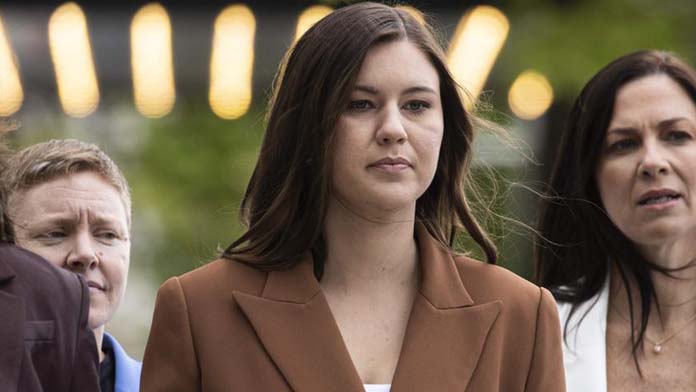Selective leaking of text messages and other evidence has been used to try to discredit Brittany Higgins, as part of a backlash against demands for action on sexism. But the debate in Canberra has revealed how toxic sexism remains a problem—with Liberal Senator David Van now facing multiple sexual assault allegations.
Higgins helped spark the “March for justice” rallies nationwide, and a reckoning about sexism within Parliament House. This brought changes for parliamentary staff, and helped discredit the Liberals.
But without the power of an ongoing protest movement the sexist institutions of the police and the court systems have savaged Higgins, and are playing host to a backlash against Australia’s #MeToo moment.
Bruce Lehrmann used an interview with Channel 7 to accuse Brittany Higgins of lying about her alleged rape in Parliament House. He claimed she told “a white lie to save a job” in the Minister’s office, after they were both investigated for breaching security by entering the building at 1.40am.
Private text messages from Higgins’ phone and a five hour recording made by Channel Ten were also leaked to the media. The evidence was collected under court orders but never used in any trial. The leak has caused outrage as an example of the way sexual assault survivors face public humiliation if they press charges in court—and the chilling effect on other women facing that decision.
Lehrmann faced trial but the case never returned a verdict, ending in a mistrial due to jury misconduct. He still maintains his innocence.
A retrial was abandoned after the ACT’s Director of Public Prosecutions (DPP), Shane Drumgold, said it would mean “ongoing trauma” and create an “unacceptable risk to the life” of Brittany Higgins, amid concerns for her mental health.
Lehrmann is currently suing Channel Ten and journalist Lisa Wilkinson for defamation over their interview with Brittany Higgins that broke the story.
Sexist police
Further evidence of the police failure on sexual assault has surfaced at an inquiry into how the case was handled.
Police in the ACT were the worst in Australia at bringing sexual assault charges, it heard.
Their specialist sexual assault team charged someone in only 5 per cent of cases brought to them in 2020, with previous years even worse.
Police everywhere are notorious for their appalling handling of sexual assault. They frequently dismiss women who report rape and are unwilling to take action. Nationwide, out of 140,000 reports to police in the ten years to 2017, just 30 per cent led to an arrest, charges or a formal caution.
And 87 per cent of sexual assaults are not even reported, according to a 2016 survey.
Superintendent Scott Moller, who led the investigation of Brittany Higgins’s assault, admitted that the ACT police sexual assault team was filled with “very young, inexperienced officers” who were “learning on the job”. Why this was the case in such an area is hard to understand.
The inquiry was launched following explosive allegations from Drumgold that police never wanted Lehrmann prosecuted, resulting in “a campaign of pressure from police” not to proceed.
Drumgold initially raised the possibility there was political pressure being applied to stop the case.
He conceded at the inquiry that a police “skills deficit”, or “atomic level stupidity” as he put it in a text message to a colleague, was actually to blame. But this does nothing to diminish the police failures.
Drumgold described a brief of the evidence prepared by police as showing “stereotypical beliefs that there is a standard way a sexual assault victim would behave”.
Senior police were also seen huddled around Lehrmann’s defence team in conversation on at least three occasions during the trial. Drumgold said this made him concerned they would “feed” the defence inaccurate information in an effort to derail the case.
Drumgold has accused ACT police of “potentially failing sexual assault complainants generally”.
Police have been using a more demanding test than was necessary, instead of referring cases to the DPP for a decision, Drumgold said. This meant they were potentially closing investigations prematurely.
The failure over sexual assault is a product of the sexism that is ingrained in the police.
Last year an inquiry concluded racism, sexism and misogyny were a “significant problem” within the Queensland police. Police were found to frequently ignore women reporting domestic violence, with numerous police officers abusers themselves.
It shows why we need an ongoing protest movement against the sexist institutions that fail women over sexual assault—and to beat back the wider sexism that means it is so widespread in the first place.
By James Supple






